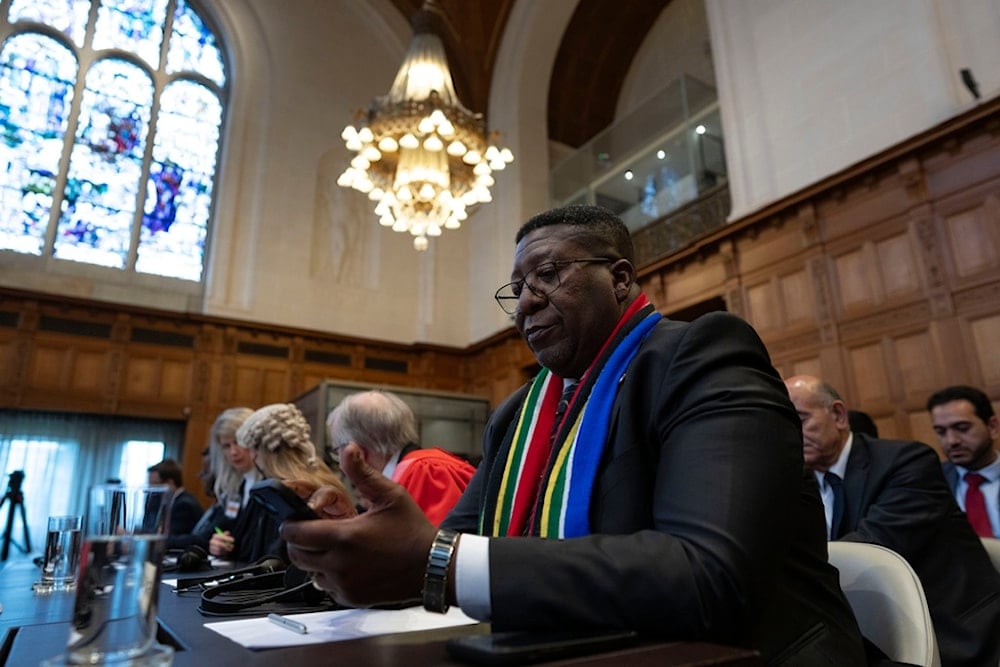SAFTU reacts following UN Committee's 'genocide' opinion
South African union SAFTU urges boycotts, divestment, and global solidarity, citing rising trade with Tel Aviv amid the ongoing genocide in Gaza.
-

Ambassador of the Republic of South Africa to the Netherlands, Vusimuzi Madonsela, waits for judges to enter the International Court of Justice, or World Court, in The Hague, Netherlands, Friday, May 24, 2024. (AP)
The South African Federation of Trade Unions (SAFTU) said the findings of the United Nations Independent International Commission of Inquiry, which say the Israeli occupation has been committing genocide in Gaza, vindicate Pretoria’s case at the International Court of Justice, where South Africa accuses the Israeli regime of violating the Genocide Convention.
Despite pressure from Western capitals, the South African government has maintained that the war in Gaza constitutes genocide under international law.
However, SAFTU criticized what it called “double-speak” by South Africa and other BRICS members, pointing to rising trade with the Israeli occupation. UN data shows South Africa exported about $178 million in goods to the occupying entity in 2024, up 23% year-on-year, including coal and metals.
China exported $14.3 billion worth of goods to “Israel” in the same period, while India’s trade reached $3.9 billion, bolstered by a new investment pact signed in 2025.
Indirect support for the genocide
The federation also named corporations it said were profiting from the conflict, such as African Rainbow Minerals, which has supplied coal to the Israeli occupation. SAFTU warned that such exports risk indirectly supporting the war by freeing up capacity for arms transfers.
SAFTU renewed its call for stronger measures, including boycotts of Israeli goods, corporate divestment, an end to arms sales, and diplomatic isolation of the Israeli regime. It urged unions and workers worldwide to escalate boycott efforts, refuse to handle Israeli goods and weapons, and organize protests to stop the war.
“Justice cannot be spoken with one mouth and undermined with the other hand,” the group said, insisting that genocide is not only the responsibility of its perpetrators but also of governments and companies enabling it through trade and investment.
Palestinian conditions worse than South African apartheid
Palestinians are enduring harsher conditions under Israeli aggression on Gaza and occupation than Black South Africans did under apartheid, Mandla Mandela, grandson of Nelson Mandela, said earlier this month.
Speaking to Reuters at Johannesburg Airport on September 4 before boarding a flight to Tunisia to join a humanitarian flotilla bound for Gaza, Mandela urged the international community to stand with Palestine.
“Many of us that have visited the occupied territories in Palestine have only come back with one conclusion: that the Palestinians are experiencing a far worse form of apartheid than we ever experienced,” he told Reuters.
Mandela, 51, stressed the parallels between the decades-long struggle against South African apartheid and the Palestinian cause, saying that global solidarity must continue as it once did for his grandfather’s generation.
“We believe that the global community has to continue supporting the Palestinians, just as they stood side-by-side with us,” he added.
Echoes of ICJ ruling
On February 20, 2024, South Africa's ambassador to the Netherlands, Vusimuzi Madonsela, said at the International Court of Justice that Palestinians faced a "more extreme" form of apartheid.
"We as South Africans sense, see, hear, and feel to our core the inhumane discriminatory policies and practices of the Israeli regime as an even more extreme form of the apartheid that was institutionalized against black people in my country," Madonsela said
He added that Israeli apartheid is simultaneously and fundamentally the settler colonialism that South Africa felt obliged "to call out and end."

 3 Min Read
3 Min Read








